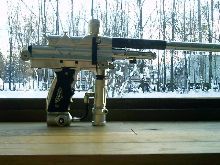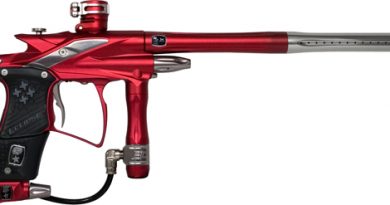My First Tournament
Tournaments for inexperienced, younger, and recreational players, can be an intimidating step towards the next level of paintball. Though they were created more or less for competition, they are meant to be fun, just like any other sport. With different series such as the Great Western Series, NPPL, APL, etc., how do you know which one is right for you and/or your team? It all boils down to being prepared, and knowing what to expect when you get there.
Getting Prepared
The first and most important thing you need to have before you even think about playing tournaments is commitment. You must have a full commitment from each and every player on your team for things to work successfully. Always have more players than you will actually need. If it is a five man tourney, take at least 6 or 7. If it is a ten man tourney, take at least 11 or 12. You have to expect the unexpected. First of all, you have to make sure that all of your players show up on game day, then you should always have alternatives in case someone gets hurt, gun goes down, or you need help getting ready in between games. Remember, these are all things you have to be prepared for. Always have extra equipment available. Guns go down, masks break, batteries die. Take plenty of carbohydrates with you to keep your energy up. Make sure you have lots of liquids to keep you hydrated. Take spray bottles and paper towels to clean off your goggles and equipment between games. Just remember, your gun may break, you might have to clean your goggles, whatever the excuse, the refs start penalizing and disqualifying late teams, so make sure that you are always prepared and on the field when you are supposed to be. The last thing the refs want to hear are excuses.
Practice makes perfect?
After you have the commitment, you have to be ready both mentally and physically. Practice is something that should be taken very seriously to help shape the playing style of your team. You need to know who can play what positions, who can play left/right handed, who your fastest guys are, who are your most accurate shots, and who can provide the best coverfire. Once you have these things ironed out, you should come up with some simple codes which you can use to communicate to each other on the field. Communication is crucial in tournaments. Without it, you might as well not even be playing because a team which communicates well, will know just how to beat you, with your team not having a clue. On game day, you and your players should be focusing on the game. Don’t waste your time arguing and complaining, but rather on what went wrong or right, and how it will possibly affect you and your players on the next game. Arguing will only make you frustrated, upset, and out of focus. Speaking from experience, most of the people that I play with (including myself) don’t do well after we get in non-constructive arguments.
Codes and Drills/Plays
Simple codes such as a letter plus the number of the opposing team shot out is a good starter. You should also come up with a code for your team, so that you know exactly how many of you (and them) are left. Some other important codes are:
– for when you (or the opponent) is going for the flag
– when a player (yours or theirs) is crawling or moving up on you
– when your gun is down (or perhaps when you are cleaning your gun)
– when your whole team needs to start pushing
– to know how much time is left in the game.
Theses are only a few codes, however, probably the most important to be able to communicate to your players. Knowing these things when they happen are very important to know when you or your opponent is making their move. These codes are the difference between winning and losing.
Drills are another important key in the success of your team. Just like any other sport, it is best to be prepared with plays to counter your opponent. You should practice drills which best simulate the tournament environment. Play 3 on 2, with the 2 trying to capture the flag. Play drills with the last 2 minutes of the game to see what happens. Do drills where your players need to move while being heavily fired upon. You should try to recreated the situations as best as possible. Another excellent suggestion would be to take your team to watch a local tournament in your area. You don’t need to play, just watch other teams, refs, and the game to see how others react.
So which is the right tourney for us?
If you have never played a tourney before, that’s fine. Look for a smaller, local tournament. Try looking for ones which are for “rookies” and first time tourney players. This is the best way to get exposure to the tournament scene without fear of being crushed by the more advanced teams. Also, know the difference between the classifications. The order is Rookie, Novice, Amateur, and Pro. A lot of tournament series are also picking up Kids divisions, which give the younger generation a fare shake at the tourney scene, without having to play against adults.
Tournaments can be quite expensive as well. You want to try and play in one where at least you have a fair chance of doing well. Just remember, its not all about winning, but playing as a team and having fun. Winning comes with experience. Play in the smaller tourneys to gain experience, knowledge, and the feel of the game at the tournament level. Just give it your best shot, and do the best you can do. You will eventually learn the do’s and don’ts on the field. You have to be willing to lose, before you can win.
Extra Pointers
To make things smoother and easier for you and your team, here are a few pointers:
– Make sure that you fill out all of the entry forms, waivers, etc. and get them turned in as soon as possible. This more or less will assure you a spot in the tournament, and makes it easier for the people running the tournament. Teams which turn in entries late, are sometimes put in harder brackets as well.
– Know all of the rules and regulations before the tournament. Print them out and give to all members of your team. Read it, learn it, know it. This could be beneficial in a controversial call in the tourney.
– Get matching shirts, jerseys, for your team. This takes a lot of the confusion out being able to distinguish between your players and your opponent. They don’t have to look like you are all pro players, just easier for you and your team.
– Have timers, stopwatches, whatever, so that you know how much time is left in the game. Most teams end up not winning their games because the time runs out.
– Get plenty of sleep. Through my experience in tourneys, the ones which I have found that sleeping well the few nights leading up to the tournament really helped. Just like exam week.




